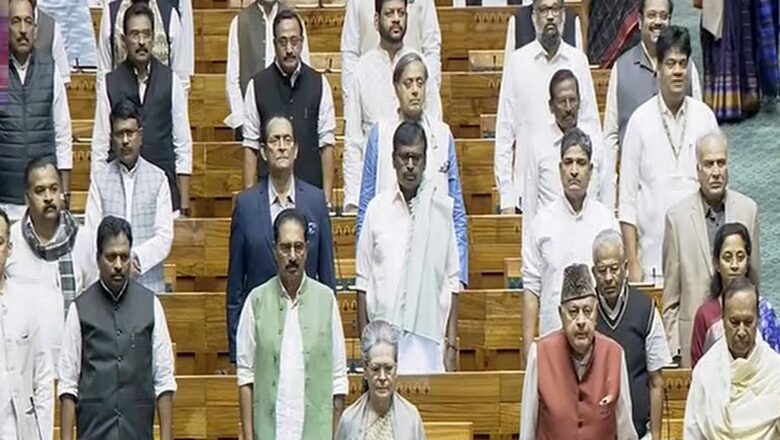
views
Assembly elections 2023 are over, results are out and a new dangerous narrative is already in the play. Within the domain of Indian polity, a risky drift has again resurfaced, the creation of a division based on territory, the North vs South India. This divisive agenda, championed by the Congress (Indian National Congress), the DMK (Dravida Munnetra Kazhagam), the BRS (Bharat Rashtra Samithi) and other political parties of South India, points to debilitating primarily the BJP (Bharatiya Janata Party) in the region in the upcoming general elections in early 2024. However, this ill-endeavour to sow friction and division among Indian voters isn’t just inexcusable, but also a sign of drowning morality and respect for the sovereignty of the nation among the Opposition.
The recent derogatory and abusive comments made by Lok Sabha MP DNV Senthilkumar S from the DMK in the ongoing winter session of parliament, where he labelled individuals from North India as Gaumutra drinkers, is a modern low for India as a nation. Such ill remarks reflect the degree to which the Opposition parties are willing to stoop in their journey for short-term political gain. The Opposition’s resort to such divisive strategies underscores their uneasiness and inability to accept their misfortunes.
In Tamil Nadu itself, the home of Dravidian parties, there’s a concerning rise in anti-Hindu activities and the advancement of divisive devout mottos in instructive educate. This inauspicious slant bodes sick for long-standing time, encouraging citizens to consider their choices carefully while casting their votes. Opposite to the Opposition’s endeavours to depict the BJP as a party kept to North India, the ground reality tells a diverse story. The BJP has risen as the single biggest party in South India, gloating 29 MPs and governing Karnataka till recently. Furthermore, the BJP holds the reins of control in Puducherry and has essentially increased, in fact, doubled its vote share in Telangana. The triumph of BJP’s K V Ramana Reddy over the sitting chief minister of Telangana and the new Chief Minister designate Revanth Reddy may be a confirmation of the party’s developing impact in South India.
In the past, the Congress-led Opposition also tried to paint the North as communal and the South as non-communal. AIMIM’s (All India Majlis-E-Ittehadul Muslimeen) Akbaruddin Owaisi’s provocative remarks and DMK leader Udhayanidhi’s vile comments on Sanatana Dharma are some of the clear illustrations of communal accounts, with the silent support from the Congress. Tragically, these occasions of Hinduphobia frequently go unchecked, with the Congress sustaining such sentiments for political pick-up.
Analysing the chronicled setting uncovers that such divisive political agendas aren’t an unused marvel. Congress, in its post-independence period, utilised an arrangement of divide & rule policy, estranging Hindus from other devout communities for the purpose of a vote bank. They also encouraged exacerbated divisions among Hindus themselves, playing on caste and devout characters. This approach, aiming for petty political gain, extremely harmed the social texture of the Hindu community. Their divisive strategies too included minority appeasement, coming about within the estrangement of Hindus.
The name of ‘Saffron terror’ and allegations of narrow-mindedness were endeavours to smother the voices of those who contradicted such divisive methodologies. These ploys discoloured the worldwide picture of Hindus, despite their inalienably open, tolerant, and peace-loving nature.
Recent moves by the Congress reveal an alarming trend of undermining the credibility and decisive nature of the Indian electorate by resorting to abusive tactics based on factors such as education, religion, aesthetics and personal preferences. In response, Prime Minister Narendra Modi took a jibe at Congress on X (formerly Twitter), and aptly warned against their divisive agenda, highlighting the ongoing challenge to overcome a 70-year-old custom while stressing the wisdom of these people to discern and also pointing out to prepare for another political meltdown in the future.
In spite of such divisive endeavours by the Opposition parties, especially Congress, to repair their picture through open visits to Hindu temples, the harm caused by a long time of divisive politics is hopeless. The Opposition’s current endeavour to make a North vs South debate is another chapter within the book of divisive legislative issues that has tormented India’s political scene. As citizens, it is significant to see through these strategies and make educated choices that maintain the solidarity and astuteness of our nation’s unity.
Lastly, the Opposition’s desperate attempts to create a divide between North vs South India and blame political setbacks on Hindus reflect their growing frustration. The BJP’s significant electoral victories in the northern states increased this discontent, leading Opposition forces to target the BJP’s national identity. Opposition parties are aware of the likely outcome of the upcoming parliamentary elections and are pursuing a divisive agenda to secure their political positions. However, the ever-growing influence of the BJP in southern India, which is characterised by cultural cohesion and unity, is a sign of wider acceptance.
India, which has historically resisted regional divisions, is most likely to reject such divisive tactics, thereby reaffirming its commitment to uniting the nation under the banner of ‘Ek Bharat-Shreshth Bharat’.
Amarjeet Verma is a Policy Researcher, Political & Social activist, and aspiring author. He addresses contemporary issues spanning people, policy, and politics with profound insight and clarity. Views expressed in the above piece are personal and solely those of the author. They do not necessarily reflect News18’s views.




















Comments
0 comment